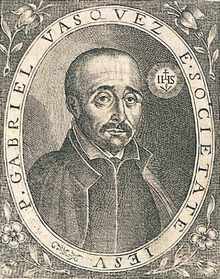Gabriel Vásquez
Gabriel Vásquez , called Bellomontanus (born June 18, 1549 in Belmonte , Cuenca , † September 30, 1604 in Alcalá de Henares ) was a Spanish theologian .
Vásquez became a Jesuit in 1569 , went to Rome as a theology professor (1585–91) and then came to the University of Alcalá , where he taught until his death. Vásquez was the opponent of Francisco Suárez . His best known work is an eight-volume commentary on Thomas Aquinas .
Vásquez, who was in the tradition of the Thomists , belonged with other representatives to the Salamanca school and was an important representative of late Spanish scholasticism there , as did Diego de Covarrubias y Leyva , Balthasar Ayala and Francisco de Vitoria . They exercised considerable influence on the early modern natural lawyer Hugo Grotius .
He was particularly well-known within the school system for the decided “value objectivism” he practiced, which led to the basic statement: natural law applies even if God does not exist.
literature
- Herman H. Schwedt: Gabriel Vásquez. In: Biographisch-Bibliographisches Kirchenlexikon (BBKL). Volume 12, Bautz, Herzberg 1997, ISBN 3-88309-068-9 , Sp. 1168-1175.
Individual evidence
- ↑ Hans Welzel : Natural law and material justice . 1962. pp. 91 and 95 ff .; on the effects on the law of reason , p. 284 f.
- ^ A b Franz Wieacker : History of private law in the modern age with special consideration of the German development . 2nd Edition. Göttingen 1967, DNB 458643742 (1996, ISBN 3-525-18108-6 ). Pp. 265 and 289.
| personal data | |
|---|---|
| SURNAME | Vásquez, Gabriel |
| ALTERNATIVE NAMES | Bellomontanus |
| BRIEF DESCRIPTION | Spanish theologian |
| DATE OF BIRTH | June 18, 1549 |
| PLACE OF BIRTH | Cuenca |
| DATE OF DEATH | September 30, 1604 |
| Place of death | Alcalá de Henares |

